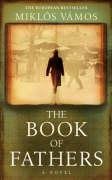The Book Of Fathers
Spanning four centuries of Hungarian history, from the solar eclipse of May 17th, 1706, to the one of August 11th, 1999, the central conceit of this novel is that the firstborn son of each generation of the Csillag family has the gift of being able to see into his family’s past and, sometimes, partially, his own future. Otherwise, they are much the same as any other family. They marry and have children, drift in and out of jobs, are sometimes prosperous and sometimes desperately poor. They have their share of criminals, revolutionaries, artists and pillars of society. They are sometimes Catholic and sometimes Jewish and sometimes decidedly vague about what they are.
During the Second World War, not only do many of the clan lose their lives in the concentration camps, but they also lose the Book of Fathers, in which the firstborn sons have recorded their lives, and the fob watch which conferred their special vision upon them. The loss of the collective memory, the loss of the past, is at the heart of the novel. The Csillags stand for something larger in the Hungarian context. As Vamos points out in his very informative historical note, Hungary has been part of somebody else’s empire for much of its history. It has struggled to develop and retain a national identity.
A warm, humorous, courageous story, the novel was slightly marred for me by the translation, which seemed clumsy in places, as though the translator had tried too hard to capture the Hungarian idiom at the expense of creating pleasing English prose. There are occasional changes in tense which seem to have no justification. But these are minor quibbles. The Book of Fathers is a wonderful reading experience. Highly recommended, especially for lovers of Marquez’s One Hundred Years of Solitude.










